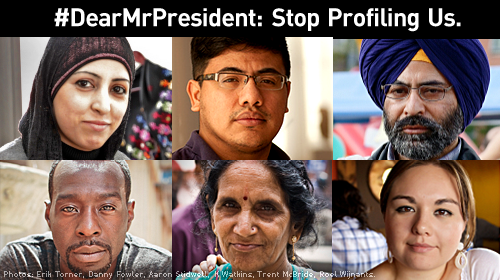
This piece originally ran on Slate.com on November 12, 2014.
Growing up in Texas as a Muslim, I often felt different and apart. But I also felt the same. My parents and their friends hosted Super Bowl parties. Every Fourth of July, we picnicked or watched fireworks on the roof of our van. At school I worried about fitting in until, as a teenager, all I wanted was to be totally different.
I read The Autobiography of Malcolm X the summer I turned 13 and returned to school with an X safety-pinned to my backpack. I didn't hold back my opinions, not even with the police officer assigned to our D.A.R.E. anti-drug school program who, as Los Angeles burned in race riots, said that Rodney King deserved to be beaten. I argued with my English teacher until she agreed that instead of writing a paper on Charles Dickens' A Christmas Carol—a book about a holiday I didn't celebrate, I stridently reminded her—I could do a class presentation on Islam.
I never worried that this behavior would land me on a list of teenagers to monitor as potential "violent extremists." It didn't occur to me that my teachers or neighbors might be cataloging my behaviors and beliefs to determine whether I was on a "pathway toward violent extremism"—or that they would consider referring me to the FBI. That would have been a bizarre response to my teenage angst. But that is what our government, in the name of "identify[ing] threats before they emerge," is now encouraging.
Under a pilot program announced this fall, the U.S. government is tasking local American Muslim communities to monitor the opinions and noncriminal behaviors of their members, especially youth. Under the moniker of "Countering Violent Extremism," communities are being asked to identify individuals who, based on factors including their political beliefs and behavior, could pose a threat. Some of these individuals will then be counseled or diverted to community-run social programs. Others could be referred to the police or FBI.
That approach may sound innocuous. But it sets American Muslim teenagers apart, stigmatizes them as potential terrorists, and drives a dividing line between them and their non-Muslim peers. It subjects them to the suspicions and conjecture of local mosque elders. It places enormous trust in the judgment of these local community "partners" about whether and when to turn matters over to law enforcement. That is especially dangerous given the FBI's record of using undercover agents and paid informants to target gullible young men in terrorism sting operations, despite their lack of ability or pre-existing intention to engage in criminal activity.
I never worried that my behavior would land me on a list of teenagers to monitor as potential "violent extremists."
Needless to say, the government's aim isn't to locate every angst-ridden Muslim teenager. Its goal is to identify individuals who may eventually plan terrorist activity or join armed groups operating, for instance, in Syria and Iraq. But in addition to advising communities to be on the watch for individuals who take steps to engage in this behavior, the government has also suggested they self-police based on malleable "indicators" and "predictors" of violence.
There is tremendous risk of abuse and mistake in any program that tries to predict future criminals, including terrorists. Empirical studies show that violent threats cannot be predicted by any religious, ideological, ethnic, or racial profiling. The evidence suggests that there is no direct link among religious observance, radical ideas, and violent acts.
Some of the theories underlying the government's approach caution just that, but they nevertheless advise law enforcement—and now, American Muslim community "partners"—to connect the dots linking an individuals' noncriminal behavior, his ideas, and his attitudes. That kind of monitoring shrinks the space for free expression by creating an atmosphere where people fear they must watch what they say and how they act, lest it be reported.
It also denies what it is to grow up. As a teenager, I became angry and difficult. I disappeared on weekends. I chatted online for hours as my family ate dinner downstairs. I wasn't a violent terrorist in the making.
But under the government's program, community members will be encouraged to monitor these behaviors and intervene with teens who engage in them. Yet not only were my growing pains a poor predictor for any tendency toward violence, they were a part of my struggle to understand myself and who I wanted to be. Freedom to explore your beliefs and identity isn't just a core value of our democracy—it's a basic need of any teenager.
The government has a legitimate role to play in identifying actual evidence of criminal activity. But we should all be able to openly discuss and debate, for example, ISIS and U.S. military responses, without fear of being reported for suspicious beliefs or behavior. The Justice Department should know better. But it has not established rules barring local U.S. attorneys and FBI agents—who are leading efforts in some cities—from asking communities to monitor First Amendment-protected beliefs and activities. Particularly in the absence of clear rules, communities eager to assist law enforcement are likely to over-report on the political opinions and religious beliefs of their members—and the Justice Department could use that information for surveillance and prosecution purposes. The White House, which is promoting these efforts, has not even established a mechanism to oversee them and track these impacts.
There are ways to engage with American Muslim communities that are more effective and rights-respecting. They require the government to give up approaches to counterterrorism that treat American Muslims as inherently suspect and single them out for monitoring based on their faith, race, or ethnicity.
I grew up in a country rife with civil rights problems. I discussed, debated, and challenged them—without incurring government scrutiny. It is the kind of freedom everyone deserves.
Learn more about Muslim profiling and other civil liberties issues: Sign up for breaking news alerts, follow us on Twitter, and like us on Facebook.

